Most States Not Prepared For Disease Outbreaks: Drug Use May Be Key Contributor To Ongoing Infectious Disease Problem

A new report suggests infectious disease preparation is inadequate in 28 states, with rising heroin use contributing to the problem. The report, Outbreaks: Protecting Americans from Infectious Diseases, ranked Idaho, Kansas, Michigan, Ohio, Oklahoma, Oregon, and Utah in the lowest category for preventing, detecting, diagnosing, and responding to outbreaks. However, Delaware, Kentucky, Maine, New York, and Virginia earned top marks from Trust for America's Health, which released the report with support from the Robert Wood Johnson Foundation.
“The country needs to establish a clear, consistent set of baseline capabilities and provide ongoing resources to be consistently ready to combat ongoing problems as well as the next emerging threat,” concluded the authors of the report.
Among the drivers of poor preparedness is rising heroin use, which directly contributes to swelling numbers of people infected by hepatitis B, hepatitis C, and HIV. Lack of awareness is a crucial factor in the spread of these viruses.
Am I infected?
While health officials estimate more than 1.2 million Americans are living with HIV, almost one in eight do not know they are infected. Similarly, nearly five million Americans may be infected with the hepatitis B virus (HBV) or hepatitis C virus (HCV), both of which place people at risk for developing serious liver diseases and cancer. However, two out of three HBV infected people and half of HCV infected people remain unaware of their disease status.
The majority of the nearly 50,000 new HIV reports in 2010 affected young gay men, yet spiking heroin use — it has more than doubled within a decade, say the authors of the report — also contributes to the spread of this virus. Injected drug abuse has a corresponding effect on hepatitis C infections. In 2013, an estimated 29,718 new HCV infections occurred, with new cases predominantly appearing among young, white, non-urban, injection drug-using people. The report further explains those most likely to become infected with hep C have a history of using opioids, such as oxycodone, and live in Eastern and Midwestern states.
Each person who injects drugs is projected to infect 20 additional people, add the authors, who stress the need for better testing and state reporting protocols.
Importantly, new cases of hepatitis C are also arising from health care-associated infections or HAIs. The Centers for Disease Control and Prevention describes HAIs, which rank among the leading causes of preventable deaths, as "infections patients get while receiving treatment for medical or surgical conditions." The CDC received reports of 44 health care-related outbreaks — an outbreak is defined as two or more cases — between 2008 and 2014. Of these, 42 (or 95 percent) occurred in non-hospital settings.
"The best offense to fighting infectious diseases is a strong and steady defense," observed the authors of the report.
Trust for America’s Health describes itself as a non-profit, non-partisan organization seeking to make disease prevention a national priority, while Robert Wood Johnson Foundation presents itself as the nation’s largest philanthropy dedicated solely to health.



























